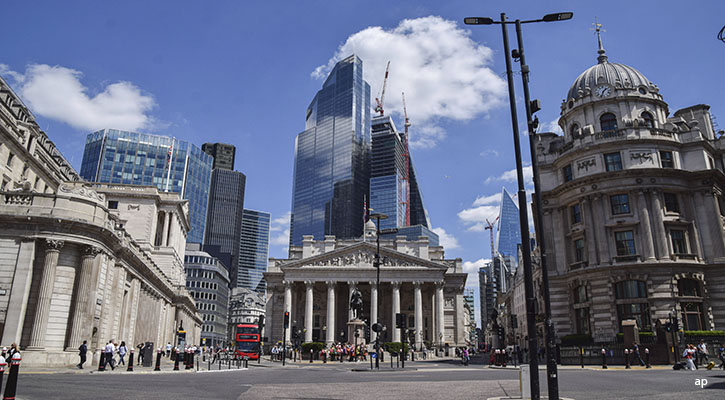
The UK stock market rally has caught many by surprise, with the FTSE 100 and Morningstar UK index hitting record highs in recent weeks. A number of factors are driving the gains, including an improving economy, a revival of M&A activity and a fall in inflation.
Which Stocks Have Driven The UK's Bull Market?
Over the last six months Rolls-Royce Holdings (RR) has been the lead driver of FTSE gains.
The stock, a standout in the industrials sector, jumped 82.03% over that time to hit a record high of 432.4p, and is now ahead of Morningstar analysts' fair value estimate of 380p. As a maker of airline engines, Rolls-Royce has been able to capitalise on the travel and transport boom since the pandemic.
Antofagasta (ANTO), the London-headquartered Chilean copper mining company, comes in close second, having delivered a 61.06% increase in its share price over that same period. That comes from lows of £14.17 to its current high of £22.73, as the business continues to benefit from elevated copper prices.
NatWest Group (NWG), the British banking stalwart whose 2023 was not exactly punctuated with brilliant news headlines, also helped boost the FTSE 100, with the company’s share price jumping 55.04% over the last six months. Its current price sits at 316.60p, some way above Morningstar analysts' fair value estimate of 280p. As banks have profited from higher interest rates, the idea that these will stay "higher for longer" have helped UK banks, which profit from the rising cost of consumer and mortgage debt.
Housebuilders have also risen this year as economic conditions improve and developers anticipate interest rate cuts and a potential change of government which could see a relaxation of planning rules. Shares in large developer Persimmon (PSN), are up 15% in the last six months as sentiment improves.
A Sustainable Shift Towards UK Stocks?
Abby Glennie, deputy head of smaller companies at abrdn, lead manager of the abrdn UK Mid-Cap Equity fund and co-manager of abrdn UK Smaller Companies, feels the FTSE's gains reflect global sentiment shifting in favour of the UK.
"Flows have improved towards the UK market and UK sectors," she says.
"A lot of the fund manager surveys have put the UK back towards the most preferred incremental areas. People were coming from very low levels of allocation, but now they are saying that the UK is the place to keep your money."
Exuberant positivity around the US economy has also begun to ease, she says, as inflation hangs around and markets defer the timing of rate cuts. This is another factor in investors reconsidering the case for investing in UK public markets.
"One of the negatives the UK has found in recent years is that it has not had the big AI exposure that the US market has. But we are now in a good point in the cycle whereby a decent chunk of industrial and domestic cyclicals are now lifting the whole UK market," she continues.
Why is The UK Stock Market Rallying?
Broader consolidation partly explains the rally, says Laura Foll, portfolio manager at Janus Henderson, and manager of Henderson Opportunities Trust (HOT), Lowland Investment Company (LWI) and Janus Henderson UK Equity Income and Growth.
"Household names" are now up for grabs by hungry peers.
"We are seeing takeovers across the breadth of the UK market and across a whole host of different sectors, and they are increasingly large companies as well," she says.
"Before we were seeing quite a few smaller companies be bid for. Those often go under the radar. But now we are seeing household names that are suddenly fair game."
One such proposed deal concerned British multinational mining giant Anglo American (AAL), which recently rejected a £34 billion bid from rival BHP Group (BHP). Shares in the company are up 18.6% over the past six months as investors price in the prospect of more potential buyers entering the fray. BHP has another week to make an improved offer.
Paper packaging brand DS Smith (SMDS) has agreed to a £5.8 billion takeover deal by its bigger US rival International Paper (IP), however. And over in the FTSE 250, Royal Mail owner IDS (IDS) is also likely to accept a takeover bid of £3.5 billion from Czech billionaire Daniel Kretinsky's EP Group.
A Domestic Revival to the UK Stock Market?
But something of a material change has occurred too. Around 25% of listed UK company revenue is derived from the UK domestic economy. Improvements on the ground are now showing in share prices.
"Remember: about three quarters of earnings come from overseas," she says.
"There is still 25% here in the UK, and it has more of an effect as you go down the market cap scale. There is more exposure to the domestic economy, and it seems to tentatively be doing better."
In 2025, the IMF expects growth in the UK to reach 1.5%, more than double the 2024 growth figure, as real incomes are supported by slowing inflation and easing wider financial conditions.
But it's not all good news. The IMF still expects the UK economy's longer-term growth to remain subdued because of weak labour productivity and illness-related inactivity.
In addition, while positive, the story under the bonnet of the UK's latest inflation figures suggests the Bank of England (BoE) may delay rate cuts. UK consumer price inflation decreased to 3.2% in March and – according to fresh figures this week – sat at 2.3% in April, just over the BoE's target of 2%. Services inflation remains sticky, however, and could prompt yet more caution from the Bank's Monetary Policy Committee, or MPC.
So what is there left to tempt investors?
While all that plays out, UK companies have continued to buy back shares, which at least provides a short-term boost to share prices. Foll is convinced this is partly what is helping the rally continue amid uncertain economic news. It certainly mirrors a US trend.
"People are frustrated at the valuations of their companies so if you [have] excess cash, you can either do a special dividend or buy back your own shares. Often shares are trading at valuation discounts in comparison to overseas peers," Foll says.
"There is also a growing number of US shareholders on company registers, and those who have a long history of seeing returns via buybacks. [They're] often telling their company boards they want to buy back rather than receive a special dividend."
How does The UK Stock Market Compare to Others?
Laith Khalaf, head of investment analysis at AJ Bell, reminds investors that, despite the enthusiasm, the UK's markets have still fallen short of indices in the US, Europe and Japan, which have all hit record highs recently. Over the last twenty years, US stock markets have significantly outperformed their European peers.
"The UK still has significant ground to make up on international peers to regain some ballast in the global stock market," he says.
"The UK weighting in the MSCI World Index currently stands at 4%, down from around 10% just over a decade ago. Probably the biggest swing factor that could improve the UK's lot is a pullback in the US stock market."
But a softer US market could have an impact here too:
"There's no sign of that, as the S&P 500 continues to crunch upwards, and, in any case, a bad spell for the US market could well have knock-on negative effects for sentiment on this side of the pond," he adds.
Rachel Winter, partner at Killik & Co, sees more value in small and mid-cap opportunities, arguing that investors should not let their excitement around the UK's large-cap companies distract them.
"The recent record high for the FTSE 100 signals investors are capitalising on the relative cheapness of the domestic market compared to the US," she says.
"We see particular value in UK small and mid-cap companies, which are trading at large discounts to their large-cap peers and could be well set to benefit from eventual rate cuts."
For now, investors await further economic updates, and the arrival of fresh blood on the public markets. Shein, and the computer company Raspberry PI, are among this year's IPO hopefuls. Both have bolstered hopes the UK can regain its international standing in capital markets – and we've written about Shein's potential flotation here.





























